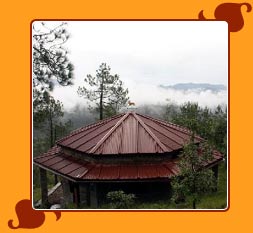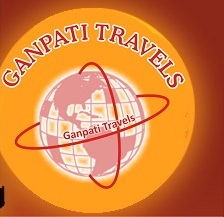The small town of Almora is perched on a hillock at an
altitude of 1650 meters above sea level, about 66 kms from Nainital. Almora
looks like a 5 km. long horse – shoe shaped ridge, where the Sitoli
forms the front arm and the bazaar the other arm. The town looks out over a
fertile terraced valley and four ranges of hills – Banari Devi, Kasan
Devi, Shyahi Devi and Katarmal. The Trishul and Nanda Devi peaks in the
great Himalayas are located beyond them. In the 16th century the capital of
the Chand rulers was shifted from Champawat to Almora.

Almora
is the district headquarters and the Vivekananda Hill Agricultural Research
Laboratory is also housed here. The town is an amalgamation of social and
cultural influences drawn from all over Kumaon. Almora was also the home of
freedom fighters, writers, journalists, editors, administrators, soldiers
and artists. Almora is one of the rare places in the hills where short
distances take hours to cover because of twisty, winding hill roads which
allows you to visit many places from one central point.
History Almora was founded by the Chand dynasty in 1560. The Chands
ruled over most of the Kumaon which comprises of the present districts of
Nainital, Almora and Pithoragarh. Almora still claims to be the cultural
capital of the area. Traces of the old Chand fort, paved roads, wooden
houses with beautifully carved facades and homes decorated with traditional
murals reflect its heritage.
Along with the rest of the UP
Himalaya, it was overrun by the Gurkhas in 1798. In the Gurkha Wars of
1814-15, it suffered heavy bombardment by the British as they endeavoured to
expel the Gurkhas. Now it is an important market town and administrative
centre with an agricultural research station. The picturesque old part of
the town is along the ridge. Swami Vivekananda came to Almora and in a small
cave at Kasar Devi, 6 kms outside the town, he reputedly gained
enlightenment and dreamt that he should share his message with the world.
Shopping
in Almora Almora has plenty of shopping centers with a 1.25 mile
stretch of covered bazaars, including the near 200-year-old Lala Bazaar.
Some of the interesting local products are Angora cloth made from the fur of
Angora rabbits and tamta (copper) vessels. The bazaar, extends from Paltan
Bazaar to Narayan Tiwari Dewal, that runs almost parallel to the motor road,
and is full of lanes and by-lanes. The Almora's Tamta artisans still use the
traditional methods to work with brass and copper. There is also a factory
for Kumaon Woolens which produces tweed in the Harris Tweed Style. This is
worth a visiting place in Almora.
Tourist
Attractions in Almora About 400 temples were built during 700 and
1300 AD in Almora district. The Sun Temple is one of the most famous temple
in Almora. The other tourist attractions in Almora are Almora Fort, Brighton
End Corner, Nanda Devi Temple, Kalimath and Simtola. From the Almora fort
one can have a 360 degree view of Almora and the surrounding mountains.
Simtola is situated about 3 km from Almora. It is a popular picnic
spot covered by a thick blanket of pine trees. Simtola was selected by Uday
Shankar for his cultural centre and studio. The Nanda Devi temple is
approached through Lala Bazaar. The temple was an important meeting place
during the freedom movement.
Sun Temple:The Sun
Temple, about 17 km from Almora, is one of the most famous temple in Almora.
Almora Fort:From the Almora fort one can
have a 360 degree view of Almora and the surrounding mountains.
Brighton
End Corner: Brighton End Corner is only 2 km from the bus station
on the Mall. It is the most popular point for sunset and sunrise views of
the Himalayas.
Nanda Devi Temple: The Nanda
Devi temple is approached through Lala Bazaar. The temple was an important
meeting place during the freedom movement. In September, the Nanda Devi Mela
is also held here.
Excursion from Almora Binsar:Binsar
is situated about 30 kms. from Almora. Binsar is one of the most beautiful
place in Almora, famous for the closer and wider view of the Himalayas. It
was also the summer capital of Chand Kings. The whole region is now under
the Binsar Sanctuary. This region is very rich in biodiversity and a centre
par excellence for Himalayan views as well as for a holiday in uninterrupted
solitude. On moonlit nights, the view of the sparking snow clad peaks is an
exhilarating experience. Binsar is a deliciously quiet and peaceful wildlife
sanctuary in the Kumaon Hills.
Jageshwar:Jageshwar
is situated about 34 km from Almora and a famous pilgrimage town. Jageshwar
was a medieval center of Lakula Shaivism and is widely accepted as the
eighth Jyotirlinga. Jageshwar is known for is magnificent cluster of 150
temples. These temples are profusely carved and built by rulers of Kumaon
between the 8th century (early Katyuri Dynasty) to the 16th century (Chand
Dynasty). There is a tourist bungalow for overnight stay.
Kausani:Kausani
is situated about 52 km from Almora at 1890 meters and is a popular holiday
centre. This small settlement, on top of a mountain, offers views of nearly
400 km of snow peaks. The peaks of Kedarnath, Chaukhamba, badrinath,
Nandghunti, Trishul, Nanda Devi Panchachuli, Api and Nampa are
breathtakingly beautiful. Kausani is a little less accessible to the madding
crowd, perched in a corner of Kumaon, who prefer not to venture further up
from the yachts at Nainital.
Bageshwar:Bageshwar
is located at the confluence of the Gomti and Saryu rivers at 3,200 feet.
The temple complex is one of the main tourist attraction. The Temple is
strung with bells, the traditional Kumaoni offerings.
How
to Reach By Air: The nearest airport is located
at Pantnagar.
By Rail: The nearest railway
station is located in Kathgodam, about 90 km from Almora via Khariua.
By
Road: Almora is linked with other places in the region including
Nainital, about 67 kms away and Ranikhet, about 50 km.






